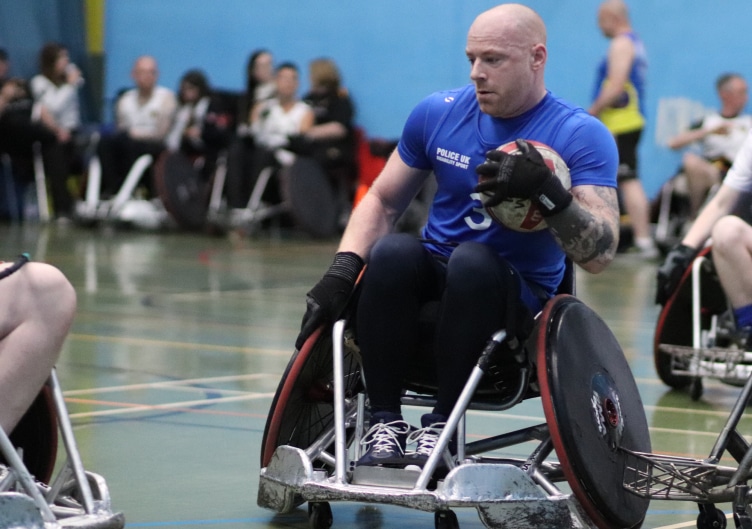
A Police Federation member from Cambridgeshire has set up an organisation to allow officers to play adaptive or disability sports.
PC Gary Callier, who lives in Huntingdon, has spoken about the transformative power of adaptive sports as he encouraged officers to take part in a taster event he’s organising.
Gary, who plays for the Northampton Saints Wheelchair Rugby team, has told how he experienced a new lease of life after taking part in the Invictus Games in Germany last year.
However, on returning to the UK he wanted to continue adaptive sports in a policing capacity but found there was no disability sports program in the service.
So he set up Police UK Disability Sport (PUKDS) in November to give police officers the chance to play adaptive and disability sports.
Now he’s organising a multi-sport event later this summer and is inviting Federation members to try out what PUKDS has to offer.
The free event will be held at David Ross Sports Village at the University of Nottingham on Saturday 3 and Sunday 4 August (10am to 6pm).
Supported by Metfriendly, Lightweight Mobility and Seating, and Recipero, it is the first event of its kind in the policing community with coaching sessions in badminton, sitting volleyball, table tennis, wheelchair basketball and wheelchair rugby.
Gary said: “We’re using the weekend to showcase all of the sports we have to offer.
“It’s an open door for everyone. It’s fully inclusive and everyone is welcome.
“Whether you’re serving, retired, staff or officer, it doesn’t matter, we’d love for you to come along and try it out.”
Gary was a former lance corporal with the Royal Engineers in the British Army until he was medically discharged in 2015.
He had a degenerative spinal condition, as well as hip problems, sciatica, PTSD, anxiety, and fibromyalgia.
Gary underwent spinal surgery in 2018, almost five years to the day his condition was discovered.
“I was wheeled in for the procedure and walked out later that day,” he said. “They cauterised the nerve endings in the base of my spine.
“What I’ve got isn’t corrective, you can’t fix it, there’s no reconstructive element to it.
“It’s pain management so stripping the nerve endings allowed me to not feel any pain associated with my lower back.
“It was like a switch had been flipped and I was back on the track sprinting. I wanted to get back to who I was pre-condition.”
Gary joined the police in 2019 and currently works for the British Transport Police out of King’s Cross Station in London.
He was selected for the Invictus Games, which inspire recovery through sport, esports, and adventurous challenge, which took place in 2022 in the Hague.
However, competing in multiple sprint events over three days left Gary barely able to walk forcing him to pull out of the 100m and 200m races to focus on the 400m.
“My back and both legs went on the final bend of the 400m,” he recalled.
“I finished the race but crawled over the line.
“That was my lightbulb moment. I could no longer compete or train at that level.”
Instead, Gary turned to adaptive sports and recalled the influence on him of Joe Dillnutt, an athletics coach and now PUKDS ambassador.
“I don’t really remember going to the first event,” Gary said. “I was standing there with my back against the wall and Joe got me to engage.
“I wouldn’t speak to anyone and he got me involved.
“If it wasn’t for him I wouldn’t be doing any of this.”
Gary said that he had to overcome feelings of being ‘a fraud’ when he started to play wheelchair sports and train towards last year’s Invictus Games in Dusseldorf.
“I had to break down my own barriers,” he explained. “I thought I’m not a wheelchair user anymore, so why am I playing wheelchair sports?
“But you don’t have to be severely disabled to play wheelchair sports, and going to Dusseldorf was about promoting adaptive sports and the inclusivity of it.”
Gary competed in wheelchair rugby, wheelchair basketball, as well as athletics and returned with three gold medals, three silver and a bronze.
Gary launched PUKDS in November to give police officers the chance to play adaptive sports and aid their recovery.
It is funded through grants, and Gary launched a petition before the dissolution of parliament for the general election calling for the Government to allocate 10 per cent of the proceeds of crime seizures each year to help police charities and not-for-profit organisations, such as PUKDS.
“More £339 million was seized last year and just 10 per cent of that for charities, which currently get nothing, would be a game-changer,” he said. “It would be established under the Police Covenant.”
